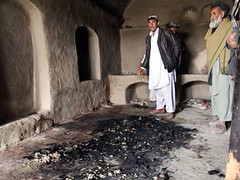I'm getting a bit tired of the "deranged" soldier story. It was predictable, of course. The 38-year-old staff sergeant who massacred 16 Afghan civilians, including nine children, near Kandahar this week had no sooner returned to base than the defence experts and the think-tank boys and girls announced that he was "deranged". Not an evil, wicked, mindless terrorist – which he would be, of course, if he had been an Afghan, especially a Taliban – but merely a guy who went crazy.
This was the same nonsense used to describe the murderous US soldiers who ran amok in the Iraqi town of Haditha. It was the same word used about Israeli soldier Baruch Goldstein who massacred 25 Palestinians in Hebron – something I pointed out in this paper only hours before the staff sergeant became suddenly "deranged" in Kandahar province.
"Apparently deranged", "probably deranged", journalists announced, a soldier who "might have suffered some kind of breakdown" (The Guardian), a "rogue US soldier" (Financial Times) whose "rampage" (The New York Times) was "doubtless [sic] perpetrated in an act of madness" (Le Figaro). Really? Are we supposed to believe this stuff? Surely, if he was entirely deranged, our staff sergeant would have killed 16 of his fellow Americans. He would have slaughtered his mates and then set fire to their bodies. But, no, he didn't kill Americans. He chose to kill Afghans. There was a choice involved. So why did he kill Afghans? We learned yesterday that the soldier had recently seen one of his mates with his legs blown off. But so what?
The Afghan narrative has been curiously lobotomised – censored, even – by those who have been trying to explain this appalling massacre in Kandahar. They remembered the Koran burnings – when American troops in Bagram chucked Korans on a bonfire – and the deaths of six Nato soldiers, two of them Americans, which followed. But blow me down if they didn't forget – and this applies to every single report on the latest killings – a remarkable and highly significant statement from the US army's top commander in Afghanistan, General John Allen, exactly 22 days ago. Indeed, it was so unusual a statement that I clipped the report of Allen's words from my morning paper and placed it inside my briefcase for future reference. More
